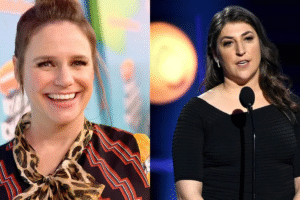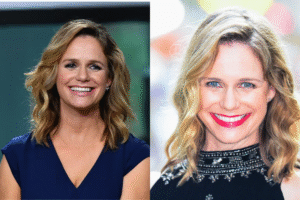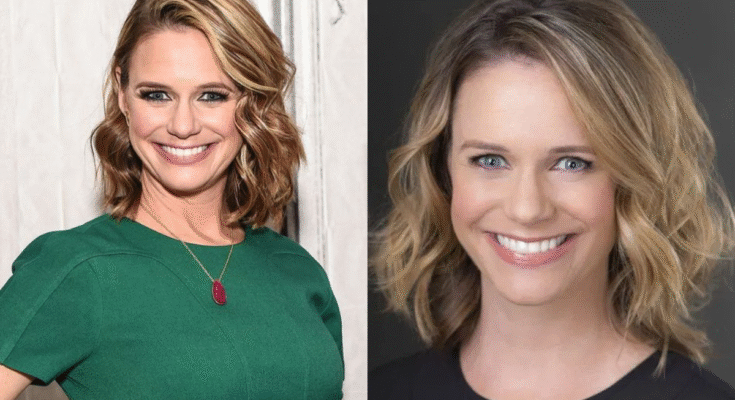The remarkable journey of Andrea Laura Barber, from unforgettable television character to education professional to mental health advocate
Introduction: Beyond the Catchphrases
Andrea Laura Barber’s life story represents one of entertainment’s most thoughtful transitions from child stardom to meaningful adult career outside the industry. Known to millions as Kimmy Gibbler, DJ Tanner’s quirky best friend on “Full House,” Andrea’s journey took her far from Hollywood into education, motherhood, and ultimately, mental health advocacy that has touched countless lives.
What sets Andrea apart from many former child actors is her deliberate choice to step away from entertainment at the height of her show’s popularity to pursue education and build a life based on personal fulfillment rather than continued fame. Her decision to prioritize education, family, and mental health over celebrity represents a powerful example of authentic living and conscious choice-making.
Her eventual return to acting through “Fuller House” was not a desperate attempt to recapture past glory, but a confident choice made from a position of personal stability and professional accomplishment. Her openness about her struggles with mental health, particularly anxiety and depression, has made her a powerful advocate for mental health awareness and treatment.
Andrea’s story illustrates that success can be measured in many ways—not just by continued fame or financial achievement, but by personal growth, authentic relationships, and the courage to be vulnerable in service of helping others. Her journey from beloved sitcom character to respected educator to mental health advocate demonstrates the power of choosing substance over spotlight.
Chapter 1: Early Life and Acting Beginnings (1976-1987)
California Childhood
Andrea Laura Barber was born on July 3, 1976, in Los Angeles, California, into a family that would provide her with the stability and values that would guide her throughout her life. Her parents, Donald and Sherry Barber, emphasized education, hard work, and staying grounded despite their proximity to the entertainment industry.
Growing up in Los Angeles meant that Andrea was surrounded by the entertainment industry from an early age, but her family maintained a normal, middle-class lifestyle that kept her connected to regular childhood experiences and values.
Her parents’ approach to her early career opportunities was careful and protective, ensuring that any professional work remained fun and educational rather than becoming a source of pressure or the primary focus of her childhood development.
The foundation of love, stability, and normal family life that Andrea experienced during her early years would prove crucial as she navigated the unique challenges of child stardom and later made decisions about her adult career and personal priorities.
Early Acting Opportunities
Andrea’s entry into acting came through typical channels for child performers in Los Angeles—auditions for commercials and small television roles that provided experience while allowing her to maintain her regular childhood activities and education.
Her natural comedic timing and distinctive personality quickly caught the attention of casting directors who recognized her ability to bring authenticity and humor to roles without seeming forced or overly precocious.
These early professional experiences taught Andrea about the technical aspects of television and film production while also providing her with confidence in front of cameras and working with other performers.
Her approach to early acting work was influenced by her family’s emphasis on treating it as one activity among many rather than the defining aspect of her identity or future plans.
“Days of Our Lives” Experience
Before landing her iconic role on “Full House,” Andrea gained valuable acting experience through her work on the soap opera “Days of Our Lives,” where she played Carrie Brady from 1982 to 1986.
Working on a soap opera provided Andrea with intensive training in television acting, script memorization, and the demanding pace of daily drama production that would prepare her for her later work on “Full House.”
The collaborative environment of soap opera production taught her about professionalism, supporting other actors’ work, and contributing to ongoing storylines that served larger narrative purposes.
Her success on “Days of Our Lives” demonstrated her ability to handle significant acting responsibilities while maintaining her education and normal childhood development.
Education and Balance

Throughout her early acting career, Andrea’s parents insisted on maintaining her education as the top priority, ensuring that she received comprehensive academic preparation regardless of her professional success.
Her academic performance remained strong despite the demands of acting work, demonstrating her intelligence and ability to manage multiple responsibilities effectively.
The balance between acting and education taught Andrea valuable lessons about time management, priority setting, and the importance of developing skills and interests beyond any single career path.
This emphasis on education would prove crucial in her later decision to pursue higher education and eventually transition away from entertainment toward a career in education.
Chapter 2: Full House Years and Cultural Impact (1987-1995)
Landing Kimmy Gibbler
When Andrea auditioned for “Full House” in 1987, she was competing for what would become one of television’s most memorable supporting roles. Her natural comedic abilities and distinctive personality made her perfect for the character of Kimmy Gibbler, DJ’s eccentric best friend.
The role of Kimmy required an actress who could be genuinely funny while also conveying the loyalty and heart that made the character lovable despite her quirky behavior. Andrea’s performance balanced comedy with authentic emotion in ways that made Kimmy integral to the show’s success.
Her chemistry with Candace Cameron, who played DJ, was evident from their first scenes together, creating one of television’s most believable and enduring friendship portrayals.
The writers quickly recognized Andrea’s comedic strengths and began developing storylines that showcased her abilities while integrating Kimmy more deeply into the Tanner family dynamic.
Character Development and Performance
Kimmy Gibbler evolved from a simple comic relief character into a complex, beloved figure who represented authentic friendship, loyalty, and the importance of accepting people as they are rather than trying to change them.
Andrea’s portrayal emphasized Kimmy’s genuine love for the Tanner family and her unwavering loyalty to DJ, creating emotional depth that elevated the character beyond mere comic relief.
Her physical comedy and distinctive delivery of Kimmy’s dialogue became signature elements of the show, contributing to memorable moments that fans still quote decades later.
The character’s evolution throughout the series allowed Andrea to demonstrate both comedic and dramatic acting abilities as Kimmy faced various challenges and growth opportunities.
Cultural Phenomenon and Recognition
As “Full House” became a cultural phenomenon, Kimmy Gibbler became one of television’s most recognizable characters, with Andrea’s performance contributing significantly to the show’s enduring appeal.
Her portrayal of Kimmy influenced how television depicted friendship, particularly female friendship, showing that real friends support each other despite differences and occasional annoyances.
The character became a cultural touchstone for discussions about loyalty, acceptance, and the value of maintaining authentic relationships even when they’re not always easy or convenient.
Andrea’s performance earned recognition from both critics and audiences who appreciated her ability to make Kimmy both funny and genuinely lovable.
Behind-the-Scenes Relationships
Andrea’s relationships with her fellow cast members, particularly the adult actors who served as mentors and the young actors who became lifelong friends, were characterized by genuine affection and mutual support.
Her professional behavior and positive attitude on set contributed to the family-like atmosphere that characterized “Full House” production and made the show’s family dynamics feel authentic.

The bonds she formed during the “Full House” years, particularly with Candace Cameron and Jodie Sweetin, would endure long after the show ended and provide important support during later challenges.
Her experience on “Full House” taught her about collaboration, professionalism, and the importance of creating positive working environments that support everyone’s success.
Managing Fame and Normalcy
Throughout the “Full House” years, Andrea’s family worked to maintain normal life experiences and keep her grounded despite the show’s success and her growing recognition.
Her approach to fame was influenced by her family’s values and her own personality, emphasizing the importance of treating success as one aspect of life rather than the defining element of her identity.
The stability provided by her family and education helped her navigate the pressures of child stardom while maintaining authentic relationships and personal values.
Her ability to handle fame gracefully while remaining true to herself would influence her later decisions about career priorities and life goals.
Chapter 3: The Decision to Step Away (1995-2004)
Choosing Education Over Entertainment
When “Full House” ended in 1995, Andrea made the deliberate decision to step away from acting to focus on her education, a choice that surprised many in the entertainment industry but reflected her personal values and long-term goals.
Her decision was influenced by her family’s emphasis on education and her own recognition that she wanted to develop skills and knowledge beyond acting that would provide her with career options and personal fulfillment.
Unlike many child actors who struggle to find work after their shows end, Andrea chose to leave entertainment while she was still successful and recognizable, prioritizing personal growth over continued fame.
This decision demonstrated remarkable maturity and self-awareness, as well as confidence in her ability to build a meaningful life outside the entertainment industry.
Higher Education Journey
Andrea enrolled at Whittier College, where she pursued her undergraduate degree while deliberately maintaining distance from the entertainment industry and focusing on academic achievement and personal development.
Her college experience provided her with opportunities to explore different subjects, develop new interests, and form relationships with people who knew her as Andrea rather than as Kimmy Gibbler.
The intellectual challenges and social experiences of college contributed to her personal growth and helped her develop the analytical and communication skills that would serve her in her future career.
Her academic success demonstrated that her intelligence and capabilities extended far beyond acting, validating her decision to prioritize education and personal development.
Graduate School and Specialization
After completing her undergraduate degree, Andrea continued her education by pursuing a master’s degree, furthering her commitment to academic achievement and professional development outside entertainment.
Her graduate work focused on areas that interested her personally and professionally, providing her with specialized knowledge and skills that would prepare her for a career in education.
The discipline and intellectual rigor required for graduate study demonstrated her commitment to excellence and her ability to succeed in demanding academic environments.
Her advanced education provided her with credentials and expertise that would make her valuable in her chosen career field while also contributing to her personal intellectual growth.

Personal Growth and Self-Discovery
The years away from entertainment provided Andrea with opportunities for personal growth and self-discovery that might not have been possible if she had continued acting throughout her teens and early twenties.
Her experiences in college and graduate school allowed her to develop her identity as an independent adult rather than as a former child star, creating a foundation for authentic relationships and personal satisfaction.
The freedom from public attention and industry pressures enabled her to explore her interests, values, and goals without external influence or expectations based on her previous success.
This period of personal development would prove crucial for her mental health and her ability to make conscious choices about her future rather than simply following expected paths.
Chapter 4: Career in Education (2004-2012)
Transition to Teaching
After completing her education, Andrea began her career as a teacher, applying her knowledge and skills in service of helping students learn and grow. Her transition from entertainment to education represented a complete career change that required new skills and perspectives.
Her background in performance and communication proved valuable in the classroom, where her ability to engage audiences and convey information clearly enhanced her teaching effectiveness.
The experience of working with students provided Andrea with new sources of purpose and satisfaction that were based on helping others achieve their goals rather than seeking personal recognition or success.
Her commitment to education demonstrated her values and priorities, showing that she had successfully built a meaningful career based on service rather than fame.
Professional Development and Excellence
Andrea approached her teaching career with the same professionalism and dedication that had characterized her acting work, continuously working to improve her skills and effectiveness as an educator.
Her commitment to professional development included ongoing training, collaboration with colleagues, and reflection on her teaching practices to ensure she was serving her students effectively.
The respect she earned from colleagues and administrators reflected her competence and dedication as an educator, establishing her reputation based on merit rather than her entertainment background.
Her success in education validated her decision to pursue this career path and demonstrated that she had found work that aligned with her values and provided personal fulfillment.
Working with Students
Andrea’s experience working with students of various ages and backgrounds provided her with insights into human development, learning processes, and the challenges facing young people in contemporary society.
Her natural empathy and communication skills, combined with her formal education training, made her effective at connecting with students and supporting their academic and personal growth.
The relationships she built with students were based on genuine care and professional competence rather than any celebrity status, creating authentic mentoring relationships that benefited both students and teacher.
Her work with students also contributed to her understanding of mental health challenges facing young people, preparing her for her later advocacy work in this area.
Personal Satisfaction and Purpose
The satisfaction Andrea found in education came from seeing students learn and grow rather than from external recognition or financial reward, reflecting a mature understanding of what provides genuine fulfillment.

Her work as an educator allowed her to use her intelligence, creativity, and interpersonal skills in service of meaningful goals that contributed to others’ success and wellbeing.
The purpose she found in teaching reinforced her decision to leave entertainment and demonstrated that she had successfully built a life based on her authentic values and interests.
This period of her life provided stability and personal growth that would be crucial when she later faced mental health challenges and considered returning to acting.
Chapter 5: Marriage, Motherhood, and Mental Health Challenges (2002-2014)
Marriage and Family Building
Andrea’s marriage to Jeremy Rytky in 2002 marked the beginning of a new chapter in her personal life focused on building a family and creating the kind of stable, loving home environment that had been important to her own development.
The couple’s approach to marriage and family reflected traditional values of commitment, mutual support, and prioritizing family relationships over external success or recognition.
The birth of their children provided Andrea with new sources of joy and purpose while also creating additional responsibilities and challenges that required careful balancing with her career and personal needs.
Her approach to motherhood emphasized being present and engaged with her children while also maintaining her own identity and professional commitments.
Balancing Multiple Roles
As a wife, mother, and professional educator, Andrea faced the common challenge of balancing multiple demanding roles while maintaining her own wellbeing and personal growth.
Her experience managing these various responsibilities taught her about time management, priority setting, and the importance of asking for help when needed.
The pressure of trying to excel in all areas of her life while maintaining perfectionist standards began to create stress and anxiety that would eventually require professional attention and support.
Her struggle to balance competing demands reflected the experiences of many women trying to “do it all” while maintaining high standards for their performance in every role.
Emergence of Mental Health Challenges
During this period, Andrea began experiencing anxiety and depression that initially seemed manageable but gradually became more significant and interfering with her daily functioning and quality of life.
The symptoms of anxiety and depression were often hidden from others as Andrea tried to maintain her public composure and professional effectiveness while struggling privately with mental health challenges.
Her experience with mental health issues was complicated by perfectionist tendencies and reluctance to seek help, reflecting common patterns that prevent many people from getting the support they need.
The impact of mental health challenges on her relationships, work, and personal satisfaction eventually became too significant to ignore, forcing her to confront the need for professional help and treatment.
Seeking Help and Treatment
Andrea’s decision to seek professional help for her mental health challenges represented a crucial turning point that required courage and willingness to acknowledge that she needed support beyond what she could provide for herself.
Her experience with therapy and other treatments taught her about the nature of mental health conditions and the importance of professional intervention in achieving recovery and maintaining wellbeing.
The process of addressing her mental health challenges also involved examining life patterns, relationships, and coping strategies that might be contributing to her difficulties.

Her success in getting effective treatment provided her with tools and strategies for managing mental health challenges while also preparing her to help others facing similar difficulties.
Personal Growth Through Adversity
The experience of facing and overcoming mental health challenges contributed to Andrea’s personal growth and understanding of herself, her needs, and her values in ways that strengthened her resilience and authenticity.
Her mental health journey taught her about the importance of self-care, setting boundaries, and prioritizing wellbeing over external expectations or achievements.
The insights she gained through addressing her own mental health challenges would later inform her advocacy work and her ability to help others facing similar struggles.
Her experience demonstrated that mental health challenges can be overcome with appropriate help and that struggling with these issues doesn’t reflect personal weakness or failure.
Chapter 6: Fuller House Return and Public Advocacy (2016-2020)
Decision to Return to Acting
Andrea’s decision to participate in “Fuller House” represented a confident choice made from a position of personal stability and professional accomplishment rather than a desperate attempt to recapture past success.
Her return to the role of Kimmy Gibbler allowed her to revisit a beloved character while bringing the wisdom and life experience she had gained through her years in education and personal growth.
The financial security and professional satisfaction she had achieved outside entertainment meant that her decision to return was based on genuine interest and the opportunity to reconnect with her television family rather than economic necessity.
Her approach to returning to acting emphasized maintaining the balance and priorities she had developed during her years away from the industry.
Evolved Performance and Character
Andrea’s portrayal of adult Kimmy in “Fuller House” demonstrated her growth as both an actress and a person, bringing new depth and authenticity to the character while maintaining the humor and heart that had made Kimmy beloved.
Her life experiences as a mother, educator, and person who had faced mental health challenges informed her performance and added layers to Kimmy’s character that resonated with adult audiences.
The evolution of Kimmy from quirky teenager to responsible adult and mother reflected Andrea’s own journey and provided opportunities to explore themes of growth, family, and resilience.
Her performance in “Fuller House” proved that her acting abilities had matured and deepened during her years away from the industry.
Behind-the-Scenes Leadership
Andrea’s return to “Fuller House” included taking on behind-the-scenes responsibilities and leadership roles that reflected her professional development and expertise gained through her education career.
Her maturity and professional experience made her a valuable contributor to the show’s production beyond just her performance, offering insights and suggestions that enhanced the overall quality of the series.
The respect she commanded from cast and crew reflected her personal growth and professional competence rather than just nostalgia for her original character.
Her leadership style emphasized collaboration, support for fellow performers, and maintaining positive working environments that reflected her values and professional experience.
Public Platform and Responsibility

Andrea’s return to public visibility through “Fuller House” provided her with a platform that she could use to discuss important issues, particularly mental health awareness and the importance of seeking help when needed.
Her approach to using her platform emphasized authenticity and helpful information rather than self-promotion or capitalizing on her celebrity status for personal gain.
The responsibility she felt to use her visibility for positive purposes reflected her values and her understanding of how public figures can contribute to important social conversations.
Her willingness to be vulnerable and honest about her own struggles demonstrated courage and provided valuable representation for others facing similar challenges.
Chapter 7: Mental Health Advocacy and Current Life (2018-Present)
Going Public with Mental Health Story
Andrea’s decision to publicly share her experiences with anxiety and depression represented a significant step in her advocacy work and demonstrated remarkable courage in discussing stigmatized topics.
Her openness about mental health challenges helped normalize conversations about these issues while providing hope and practical information for others who might be struggling with similar problems.
The positive response to her advocacy work validated her decision to be vulnerable and showed the value of public figures using their platforms to address important social and health issues.
Her approach to mental health advocacy emphasized education, reducing stigma, and encouraging people to seek professional help rather than trying to handle mental health challenges alone.
Professional Speaking and Education
Andrea’s advocacy work expanded to include professional speaking engagements where she could share her story and provide education about mental health in more depth than media interviews allowed.
Her background in education made her particularly effective at presenting complex information about mental health in accessible ways that could help audiences understand and apply important concepts.
The response to her speaking engagements demonstrated the hunger for authentic, knowledgeable voices in mental health advocacy and the value of her contributions to this field.
Her speaking work provided her with new sources of purpose and professional fulfillment while allowing her to help others in meaningful ways.
Writing and Content Creation
Andrea’s advocacy work includes writing and creating content that provides education, support, and inspiration for people dealing with mental health challenges and their families.
Her writing combines personal experience with research and professional knowledge to create resources that are both relatable and informative for people seeking help and understanding.
The success of her written work demonstrates her ability to communicate effectively about complex topics while maintaining the authenticity and humor that characterize her personality.
Her content creation allows her to reach larger audiences and provide ongoing support for people who might not have access to other mental health resources.
Continued Professional Balance
Andrea has successfully maintained her commitment to education and family while expanding her advocacy work, demonstrating her ability to balance multiple meaningful pursuits without overwhelming herself.
Her approach to professional balance reflects lessons learned from her earlier struggles with perfectionism and over-commitment, emphasizing sustainable practices that support her mental health and personal values.

The integration of her various professional activities—acting, education, and advocacy—creates a fulfilling career portfolio that allows her to contribute to different areas while maintaining personal wellbeing.
Her success in managing multiple professional commitments while prioritizing mental health provides a positive example for others trying to balance career ambitions with personal needs.
Current Family Life and Relationships
Andrea’s current approach to family life and relationships reflects the wisdom gained through her mental health journey and her commitment to maintaining authentic, supportive connections with the people who matter most to her.
Her experiences have taught her about the importance of communication, boundary-setting, and prioritizing relationships over external achievements or expectations.
The stability and satisfaction she has achieved in her personal life provide a foundation for her professional work and advocacy efforts while demonstrating that recovery and growth are possible.
Her family relationships continue to be sources of strength and motivation for her ongoing work to help others while maintaining her own wellbeing and personal growth.
Conclusion: Authenticity, Service, and Resilience
Redefining Success
Andrea Barber’s life story represents a redefinition of success that emphasizes personal fulfillment, authentic relationships, and service to others rather than fame, wealth, or external recognition.
Her deliberate choice to step away from entertainment at its peak to pursue education and personal growth demonstrated remarkable wisdom and self-awareness that served her well throughout her life.
The success she achieved in education, family life, and mental health advocacy proves that meaningful careers can be built on values and service rather than celebrity or financial gain.
Her journey illustrates that success should be measured by personal satisfaction, positive impact on others, and alignment with authentic values rather than external markers or comparisons to others.
Mental Health Leadership
Perhaps most importantly, Andrea’s openness about her mental health challenges and her advocacy work have provided crucial leadership in an area where stigma and misunderstanding continue to prevent people from getting help.
Her willingness to be vulnerable about her struggles while also demonstrating recovery and growth provides hope and practical guidance for others facing similar challenges.
The credibility she brings to mental health advocacy through her personal experience, professional knowledge, and communication skills makes her a uniquely valuable voice in this important field.
Her work helps bridge the gap between professional mental health information and personal experience, making resources more accessible and relatable for people who need support.
Professional Versatility
Andrea’s successful transitions between acting, education, and advocacy demonstrate remarkable professional versatility and the value of developing multiple skills and interests throughout life.
Her ability to excel in different fields while maintaining her essential personality and values shows that career changes can be sources of growth and fulfillment rather than just responses to circumstances.
The integration of her various professional experiences creates a unique skill set that enhances her effectiveness in all areas of her work while providing personal satisfaction and security.
Her example encourages others to consider non-traditional career paths and to view professional development as an ongoing process rather than a single decision made early in life.
Lasting Impact
Andrea Barber’s impact extends far beyond her entertainment career to include meaningful contributions to education, mental health awareness, and cultural conversations about authenticity and personal growth.
Her story provides inspiration for anyone seeking to build a life based on personal values rather than external expectations, showing that authentic choices can lead to profound satisfaction and positive impact.
The example she provides of using personal struggles as foundations for helping others demonstrates how adversity can be transformed into sources of strength and service.
Her ongoing work in mental health advocacy ensures that her influence will continue to grow and help people long after her active career in any single field, creating a legacy based on genuine contribution rather than just entertainment value.
Andrea Barber’s journey from beloved television character to respected educator to mental health advocate illustrates the power of authentic living, conscious choice-making, and the courage to be vulnerable in service of helping others. Her story reminds us that the most meaningful lives are often built not on avoiding challenges, but on facing them honestly and using our experiences to contribute positively to the world around us.



